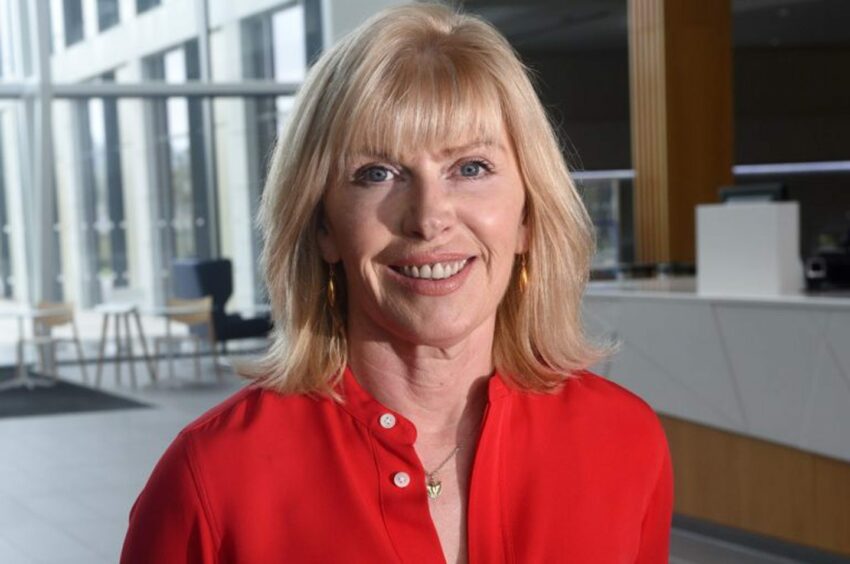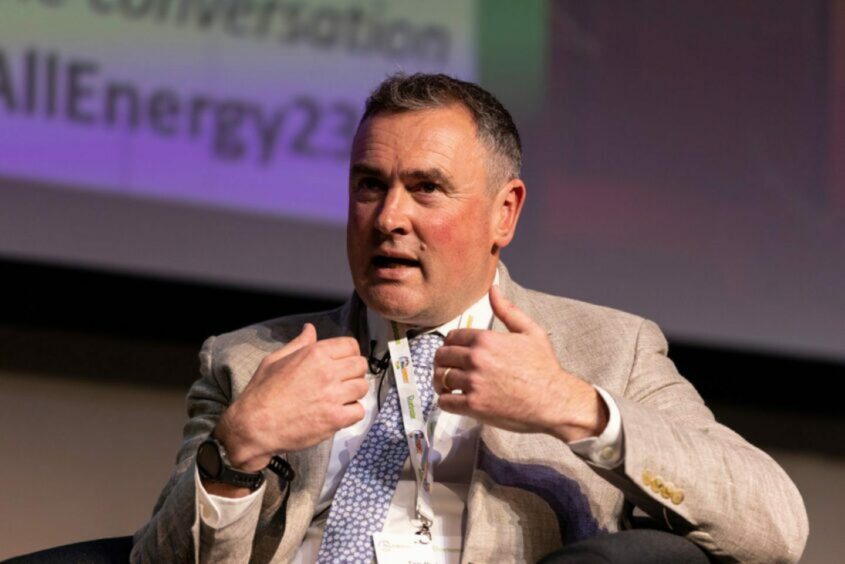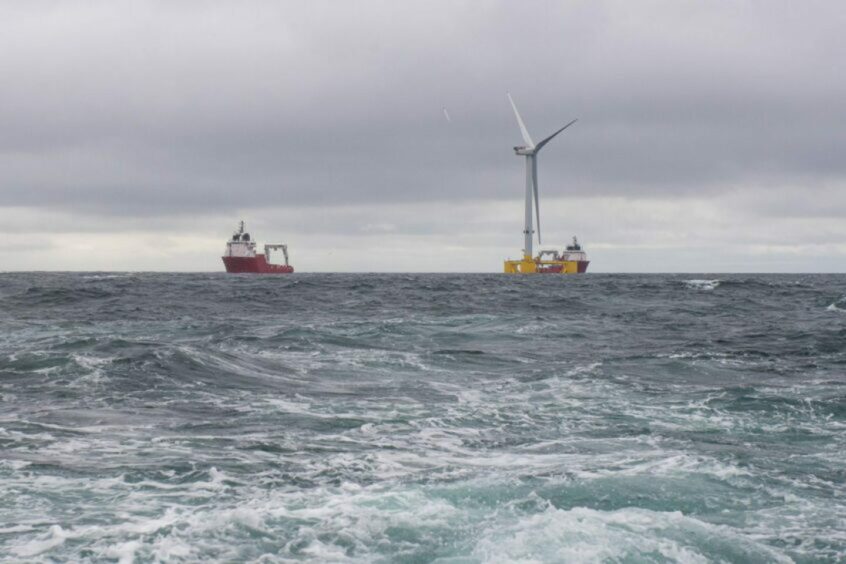
As the energy industry turns its attention to Aberdeen for Offshore Europe, Sian Lloyd Rees, the industry’s appointed supply chain champion, says firms are geared up for the opportunity at this this “global” event.
Delegates are coming from all over the world to be part of the first in-person Offshore Europe since 2019.
Ms Lloyd Rees, said: “Offshore Europe is global, as opposed to local, but of course, as it’s hosted in Aberdeen, it is a potential showcase for a number of the companies, small and large, here in Aberdeen.
“I believe the floor space is all rented out, so there’s a lot of interest and excitement in attending it. There will be attendees from around the globe, the Middle East in particular I believe, this year has a strong attendance.”
In a conversation with Energy Voice, Ms Lloyd Rees, explained that while attention is often given to the ‘UK supply chain’ much like Offshore Europe, the market is global.
She continued: “Whilst we talk about the UK supply chain, we’re really talking about a global supply chain that is based in the UK.”
Supply chain challenges
With the ‘boom and bust’ nature of the hydrocarbon market, supply chain firms see work dry up when operators tighten the purse strings and over the last decade, the UK in particular has dealt with a number of issues.
Ms Lloyd Rees said: “We’ve been through a number of upturns and downturns and of course, many different companies have many different capabilities, amongst around 200,000 people.
“From 2014 onwards, we saw a steady downturn, you couple that with the fact that the UK is a mature basin and is declining naturally, of course, we’ve seen a contracting of the workforce, we’ve seen a contracting of work and obviously the margins that supply chains need to be able to operate.”
In addition to the oil downturn experienced in the middle of the last decade and the UK’s natural decline in resources within the North Sea, British firms are also competing with political factors.
The UK supply chain champion continued: “Add to that COVID and the complete stop in activity for a short period of time before picking back up.
“Coming out of that then we have Brexit, we have inflation that’s happened since then, and of course, the energy profits levy, which has caused great uncertainty around the work scope.
“We’re seeing the costs for materials and services increase in third party costs and materials increasing by up to 20%.”
All of these factors are mounting up for domestic supply chain firms, with operations being spread across traditional hydrocarbon work and renewables, Sain Lloyd Rees says cash is being spread thin.
Despite the “natural resilience” that the UK supply chain describes in the sector, “there’s not enough spare cash to do the R&D to be able to understand what the transition means to be able to bounce back quite as easily,” Sian Lloyd Rees explained.
“It’s been quite a sustained period of downturn for the supply chain.”
The opportunity of the energy transition
In addition to being the UK supply chain champion, Sian Lloyd Rees is also the UK managing director for Mainstream Renewable Power.
In this role, her work with supply chain firms also plays a part.
She explained “My role with Offshore Energies UK is really a part of the North Sea transition deal, it was there that we made an agreement with the government that a £16 billion investment from the industry and from the government to be able to support the decarbonisation of the oil and gas, hydrogen and carbon capture.
“A really key element of this was around the supply chain, it was around looking at one of the most productive supply chains in the UK, the government’s words, and helping them to understand what the energy transition could mean for their business.”
Offshore wind infrastructure
However, despite there are opportunities within the energy transition, issues such as inflation are hitting areas such as offshore wind.
This represents “the challenges that the industry is facing going forward,” said Sian Lloyd Rees.
To help combat these challenges, the domestic energy supply chain needs to have “visibility of what future opportunities are” while the sector needs to show “predictability.”
The UK supply chain champion explained: “Visibility without predictability isn’t much use. In terms of predictability, the energy profit levy has impacted predictability, the cost of materials, projects no longer being viable, has also impacted.”
Supply chain firms also experience issues with securing work through process called contracts for difference (CfD).
CfDs have come under fire in the past, the UK’s offshore wind champion, Tim Pick, has previously supported a change to CFD mechanisms to support the supply chain.
In March this year, Mr Pick suggested “introducing Non-Price Factors into the CfD auction process.”
The offshore wind champion suggested that the government promotes a circular economy by incentivising the use of “Green Steel and wider industrial decarbonisation” as it would reduce dependency on critical minerals and create green jobs.
Ms Lloyd Rees concurs, telling Energy Voice: “When you then move into the renewable space, if we take wind as an example, you may see a huge number of seabed leases allocated. But the developers are in competition right up to the point when they can gain a commercial mechanism, the contract for differences called in wind.
“So until they’ve got that contract for difference, which actually happens about five, six years down the line, and immediately thereafter, you need to move into construction.”
The UK supply chain champion said that there is “no actual certainty on projects going ahead until the point where they need to construct.”
She explained that it is “very difficult for the supply chain to get ready to make the investment that they need.”
Taking pointers from across the pond
The UK is not the only country to have run into these supply chain issues that limit the transition to cleaner renewable energy, however, it may be falling behind when it comes to introducing solutions to these problems.
Sian Lloyd Rees pointed to the Inflation Reduction Act in the US as a prime example of how to tackle the issues the UK is facing in its supply chain.
She says: “It’s that early investment is a challenge, which we’re seeing other countries address much better than we are at the moment, the Inflation Reduction Act in the US is a super way to start building that industrial strength.
Ms Lloyd Rees adds: “Denmark, and a number of European countries have done the same. So I think the early investment, and we are talking about early investment now in a success story. We’re not talking about propping up local industries for the sake of doing it.”
UK ports ‘in discussions with the wind developers’
As the developers of major UK offshore wind projects announce work is going to mainland Europe for the upkeep and maintenance of infrastructure, there is criticism from industry that contracts are not being made with domestic firms.
Tim Pick said it was a “national disgrace” that maintenance work on the UK’s flagship floating wind project off Aberdeen had to be conducted overseas.
It was announced earlier this year that a Kincardine floating wind turbine, which sits just 10 miles off Aberdeen, would be towed hundreds of miles to Rotterdam for scheduled maintenance because the UK doesn’t have facilities to service it.
However, the UK is looking to change this with new infrastructure coming into place, like Aberdeen’s South Harbour which recently brought the 200-metre-tall Noble Innovator jack-up rig to the Granite City.
The UK supply chain champion said: “The plan that the harbour has at the moment is engaging with the wind developers and it just needs a bit more dredging, but it could easily take those structures in.”
She added: “Aberdeen harbour is the closest to Kincardine, I mentioned that one, but there are many good ports all around the UK.”
Sian Llyod Rees said that ports across the UK are “absolutely engaged” and are “now in discussions with wind developers in order to take this forward.”
For the UK supply chain champion, there is hope for domestic supply chain firms throughout the energy transition, however, she explained that the government must play its part.
Ms Lloyd Rees explains: “If you look at the next round of wind leases, seabed leases, in the Celtic Sea, one of the pre-qualification requirements for all of the developers is to provide a plan of how they will use an integration port in the UK, before they sail out.
“That will encourage the developers and that’s what’s needed from the government is signals. What’s important to invest in, because no one developer can invest the amount that’s needed. But if there’s a clear signal on where the priorities are, developers, collectively come together. And that’s how we’ll see things change.”
Recommended for you


 © Supplied by DCT Graphics
© Supplied by DCT Graphics © Supplied by All-Energy
© Supplied by All-Energy © Supplied by KATH FLANNERY / DC T
© Supplied by KATH FLANNERY / DC T